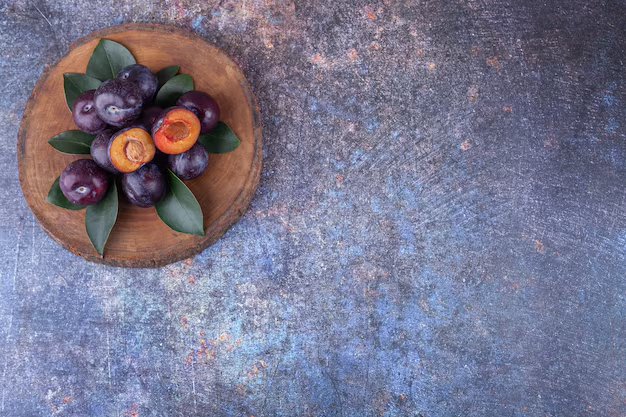How to Keep Your Plums Fresh: Should You Store Them in the Refrigerator?
When it comes to keeping food fresh and extending its shelf life, the question of whether to refrigerate can often be puzzling. Plums, with their rich flavor and myriad of health benefits, are no exception to this dilemma. Should they be kept on the countertop, or do they demand the cool embrace of the refrigerator? This question isn't just about preference; it's about practicality, and finding the best methods to ensure your plums are in tip-top condition.
Why Plums Matter
Plums come in a dazzling array of colors, flavors, and textures, making them a staple in many households. Not only are they delicious, but they're also packed with essential nutrients like vitamins A, C, K, and numerous antioxidants. Whether eaten fresh or dried as prunes, plums offer a bevy of health benefits, such as improved digestion and cardiovascular health. Understanding how to best store them is crucial for preserving their nutritional value and flavor.
🍑 Room Temperature vs. Refrigerator
Ripening Your Plums
If your plums are not quite ripe when you buy them, it's best to allow them to ripen at room temperature. They should be kept on a countertop, away from direct sunlight. As plums ripen, they'll become softer and more fragrant—key indicators that they're ready to eat. Once ripening is complete, think about moving them to refrigeration to prolong their life.
Refrigeration: A Cooler Choice
Once your plums are ripened to your liking, storing them in the refrigerator can actually extend their freshness by several days. The cold slows down the metabolic processes that cause fruits to over-ripen and spoil. Additionally, refrigerating plums after they've ripened may help maintain their juiciness and flavor for longer.
The Downsides of Refrigeration
While refrigeration can keep plums from degrading quickly, it may also alter their texture slightly. Plums kept in a too-cold environment might lose a bit of their juiciness and become chewier. The key is to keep your refrigerator at a consistent temperature, ideally around 40°F (4°C), which is adequate for maintaining freshness without compromising quality.
🍏 Practical Storage Tips
- Countertop Ripening: Use a fruit bowl and keep unripe plums at room temperature.
- Checking Ripeness: Gently squeeze your plu; if it yields slightly, it's ready to eat or refrigerate.
- Refrigeration: Place ripe plums in a breathable container or a plastic bag with holes in it.
- Avoid Moisture: Excess moisture can cause plums to mold. When storing in the fridge, keep them dry.
👇 Quick Tips
- Room Temperature 🍑: Perfect for ripening unripe plums.
- Refrigerator 🧊: Best for storing ripe plums to slow down spoilage.
- Avoid Sunlight ☀️: Direct sunlight can hasten ripening too quickly.
- Consistent Temperature 📉: Maintain a steady 40°F (4°C) in your refrigerator.
Related Subtopics for Plum Lovers
The Science Behind Fruit Ripening and Storage
Understanding the science of fruit ripening can help extend the life of not just plums but all fruits in your kitchen. As fruits like plums ripen, they produce ethylene gas, which accelerates ripening in nearby fruits as well. That's why it's crucial to store plums separately or use vented storage bags to allow gases to escape.
The Versatility of Plums
Beyond just eating fresh, plums are incredibly versatile. They can be baked into desserts, made into jams, or even used in savory dishes like sauces for pork. Knowing the best storage methods ensures that when it's time to use them, they've maintained their full flavor and nutritional capacity.
How Refrigeration Affects Nutritional Content
While refrigeration is excellent for preserving texture and taste, there's a broader discussion on its effect on nutritional content. Cold temperatures can sometimes degrade enzymes and vitamins in fruit. However, the trade-off usually pays off, as an overripe plum at room temperature loses far more nutrients than one that’s been refrigerated properly.
Addressing Common Misconceptions
Myth: Refrigerated Plums Lose Flavor
A common myth is that refrigeration sucks the flavor out of plums, leaving them bland. In reality, while refrigeration can alter texture over prolonged storage, it seldom affects the fruit's flavor profile if consumed within a reasonable timeframe.
Myth: Plums Last Forever in the Refrigerator
Refrigerators help, but they aren't magic. Just because you've refrigerated your plums doesn’t mean they'll last indefinitely. For optimal taste and nutrition, aim to consume them within a week of refrigeration.
Making the Most of Your Plums
Whether storing for daily consumption or special recipes, knowing the ins and outs of plum storage enhances your enjoyment of this delicious fruit.
5-Day Menu Plan with Plums 🗓️
- Monday: Fresh plum slices with your breakfast cereal or yogurt.
- Tuesday: Plums in a chicken salad for lunch.
- Wednesday: Marble-seared pork chops with a plum reduction.
- Thursday: Plum and berry smoothie for a mid-morning snack.
- Friday: Plum cobbler for dessert.
Final Thoughts
Plums are a succulent fruit with a short shelf life at room temperature once ripe, yet they benefit immensely from refrigeration after reaching full ripeness. The key is understanding when to make the switch and how to keep conditions optimal for storage. In doing so, you'll enjoy plums that are both flavorful and nutritious, ready to complement numerous dishes or enjoyed on their own.
By considering the guidelines above, you'll be well-equipped to maintain the balance between freshness and flavor, turning your kitchen into a haven for plums and other fruits alike. 🍑

